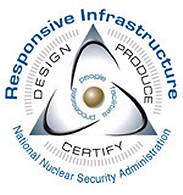2006年VOA标准英语-Americans Begin Debate on US Nuclear Weapons Pr(在线收听)
By Stephanie Ho
Washington
27 December 2006
A debate is beginning to take shape once again in the United States between supporters and opponents of nuclear weapons. In the 1990s, following the end of the Cold War, many Americans questioned whether the United States even needed nuclear weapons. This time, the discussion is being driven by the Department of Energy's proposal for a multi-billion dollar, multi-year process to upgrade facilities that store, develop and assemble nuclear weapons. VOA's Stephanie Ho reports from Washington.
The National Nuclear Security Administration's Thomas D'Agostino publicly presented the so-called "Complex 2030" proposal in October. He said it is aimed at repairing and replacing, by the year 2030, what he described as "inefficient, old and expensive [to maintain]" facilities scattered around the United States. It calls for one central facility to consolidate production and storage of U.S. weapons-grade plutonium, which D'Agostino told a New Mexico newpaper would reduce security costs.

The plan would replace the current U.S. stockpile of more than 5,500 nuclear bombs and warheads with a smaller arsenal that the proposal says will be more reliable. The world's two largest nuclear weapons powers, the United States and Russia, have pledged to reduce their nuclear arsenals to between 1,700 and 2,200 warheads each, by 2012.
Before the U.S. government can proceed, though, the Department of Energy must study how the plan will affect the environment and seek public comment.
At the last of a series of 17 public meetings, in Washington in mid-December, the National Nuclear Security Administration's Ted Wyka said "Complex 2030" is needed to make sure the current U.S. nuclear weapons stockpile is working and up-to-date.
"Now, we must continue to ensure the safety and reliability of the nuclear weapons stockpile, without the underground testing," he said.
The Comprehensive Test Ban Treaty, which was adopted in 1996, bans all nuclear test explosions.
But Wyka stressed that as long as the United States has nuclear weapons, it also has to maintain them.
"We must have a responsive infrastructure to support the stockpile, because we know that stockpile repairs and replacements will be required," continued Wyka. "Components will continue to age. It will continue to wear out, and we must be in a position to fix those type of problems."
In spite of government assurances that "Complex 2030" is necessary and will be safe, many critics are not convinced.
At the Washington hearing, Susan Gordon, of the Alliance for Nuclear Accountability, said she opposes the existence of nuclear weapons, at all. She said she believes the latest plan is an excuse for ramping up U.S. nuclear weapons production and capabilities. Gordon urged Americans to question what she describes as a U.S. dependence on nuclear weapons, and she says the United States is setting a bad example for the rest of the world.
"It is now time for the American public to begin a national debate on current U.S. foreign policy that relies on nuclear weapons as a cornerstone of our security," she noted. "U.S. proposals to build new nuclear weapons, while at the same time trying to prevent Iran and North Korea from developing them, severely undermine U.S. credibility in the international community."
The "Complex 2030" project also has united members of the religious and scientific communities in opposition to the plan, which both groups say goes against the spirit of nuclear arms reduction.
Twenty-three national religious organizations, representing Baptists, Catholics, Episcopalians, Evangelical Christians, Mennonites, Methodists, Quakers and Unitarians, were among those who signed on to a formal statement of opposition.
The Greek Orthodox Church was represented at the Department of Energy hearing by John Chryssavgis.
"Why is increasing nuclear armament still even being uncritically considered as a viable option? The sheer costs are exorbitant, human, financial, environmental, moral," he said.
Scientific groups that oppose the plan include Physicians for Social Responsibility and the Union of Concerned Scientists. The Union's Robert Nelson says the American public should push for the complete elimination of nuclear weapons, not programs that he says move the United States in the opposite direction.
"We need to get rid of them [nuclear weapons]. What is Complex 2030 about? It's about maintaining nuclear weapons forever," he said.
In an interview, the National Nuclear Security Administration's Wyka said all points of view will be taken into consideration when the final proposal is formulated. But he cautioned that as the Complex 2030 proposal process continues, one issue his office is not examining is whether the United States should even have nuclear weapons.
"The purpose of this effort is not to debate the types and levels and compositions of nuclear weapons in our arsenal," said Wyka. "That decision is made in other platforms."
The "other platforms" he referred to include presidential directives and actions by Congress.
Wyka stresses that his agency's job is limited to ensuring the safety, reliability and security of whatever U.S. nuclear weapons stockpile exists.
The "Complex 2030" process has just started. Members of the public can still send any comments to the National Nuclear Safety Administration during this initial period, which ends mid-January. Wyka indicates that after some fine-tuning on the proposal, there will be another round of public hearings in about six months.